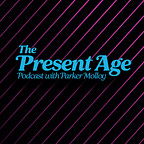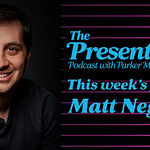Parker Molloy: Joining me today is former Congressman Joe Walsh.
Joe Walsh: Hey, Parker. It's awesome to be with you.
Yeah. Yeah. Thanks so much for taking the time to talk with me. This is not a conversation I could have pictured having, I don't know, two years ago, so it's-
No, crazy times, and you and I have come together on some things.
Yeah.
And I've learned some things from you, Parker. So thank you.
So one of the reasons I wanted to talk to you is that you are kind of the rare example of someone who was a very big Trump supporter, going into the election you were fully behind him. Before the election, you said something like-
The musket.
The musket thing. That was it. "If Trump loses, I'm grabbing my musket." And that kind of became like a running thing for you, where'd you tweet that, and even after you kind of turned on Trump a little bit, you were still like, "I'm still holding my musket." So it's been interesting to watch as you grew disillusioned with Trump and then kind of the overall Republican party.
Yeah.
And I think some people get this wrong and think that because you don't support Trump or because you don't support the Republican party that suddenly your policy positions have changed, which is not the case from what I've seen and from what you've said.
Yeah.
People are like, "Why don't you join the Democratic Party?" Well, because they probably feel just as uncomfortable a home as Republicans.
Actually, less so, but Parker, look, when I write the book one day— You're right in that I don't know anybody else who made my journey from Trump supporter to outspoken enemy of Trump. I wasn't a huge supporter. I voted for him because he wasn't Hillary. I didn't take him seriously. I didn't pay enough attention to him. He blocked me on Twitter during that 2016 campaign, because I would criticize him. And the musket tweets, some of that shit, I did because it was fun and I love muskets. But, overall, your point is a good one.
Sure.
I went from a Trump supporter to probably his most outspoken conservative opponent. It cost me everything doing that, so why the hell did I do it? Because he's an utterly horrible human being who I believe is an existential threat to this country. I wish I'd known that in 2016. I wish I'd paid better attention.
And that is one thing that I've been thinking a lot about is what's the status of your radio show? Did you say that it got-
Gone.
Gone. Okay. So radio show, gone, but when you were doing it, you would speak to Trump supporters.
Trump supporters, yeah.
Constantly. When you would try to push back on the things that they were saying, their defenses of him, what do you think is the kind of the root cause of why so many people are so devoted to that one man and that specific kind of Trumpian movement?
Parker, because he fights the people and the things they hate. They get to live through him. He fights their fight. And who are we talking about, Parker? We're primarily talking about older white people, men and women. That's the Republican Party base. These are people who are unhappy. They've got some legitimate grievances, and you and I have talked about this. Their America seemingly was changing overnight and the Republican Party establishment ignored these people. And Parker when I was in Congress and back on the radio and on Fox News, I would tell the Republican Party establishment, "You better pay attention. These older white folks, they're scared about things. They need to be educated." But the party ignored them.
So then along came Trump and he said, "I'm going to build a wall, keep the bad people out. You'll be able to say Merry Christmas again. There are only boys and girls, two genders. We'll bring back 1954 America." It was all bullshit, Parker, but he was the first politician who said, "I hear you. And I'll bring back 1954 America."
Yeah. That definitely seems to kind of track. And that reminds me. So, the thing that you were saying about feeling overlooked, feeling left behind by the establishment and stuff like that, because that's a fair point, but it reminds me of something that in 2008 Barack Obama was asked about how he, as someone who was a first-term Senator, as a black man, could connect with white working class voters. And he responded by saying, "The truth is that our challenge is to get people persuaded we can make progress with. And there's not evidence of that in their daily lives. You go to some of these towns in Pennsylvania, and a lot of the small towns in Midwest, jobs have gone for 25 years now, nothing's replaced them. Clinton administration, Bush administration, every successive administration has said they'll do something, blah, blah, blah, blah, blah, et cetera, et cetera."
So far that statement is very much like, yeah, exactly. They felt left behind. And then he made the mistake of saying, "So it's not surprising that they get bitter. They cling to guns and religion."
They cling to their, there you go.
And so like that became the soundbite, but the overall message was pretty-
Was spot on.
-spot on. And I think that that's kind of the downside of our political media is all soundbites.
Yes.
And no one was talking about what he saying. All that people remember from that is, "He said that we cling to our guns and religion." Obviously, should have worded that better on his end, but at the same time, I feel like that might be where political media has failed in a sense that it takes something that's the most incendiary portion of a statement and they just run with it and strip it from context. And that happens to people all over the place.
Yeah.
I mean, you catch someone saying something, catch Mitt Romney saying that basically 47% of the country is freeloaders or whatever.
Right.
And that's what stands out and you miss whatever the larger point is. Same thing with-
And then Parker, what you get is, and because I was very outspoken, I didn't care about that, but what you get is you get politicians who then are afraid to speak.
Yeah.
And they're afraid to say what they mean. They're afraid to be honest because of what you call the got you. It's all about the got you. We're so damn tribal. Both sides do this. I think Fox News and the Trump side is a whole nother level now. I mean, I come from the world of conservative talk radio. You know it's all about riling these people up. And I did some of that, but man, that's all it is now. It's just every night, pissing these white folk off.
Yeah. Well, and that's something that comes up a lot when I was working at Media Matters and watching way too much Fox News.
Yeah.
Was this idea you turn on the TV and you're like, "What are we mad at today?" And it would always be some weird little grievance that is supposed to hammer home that message that the America that you know is being taken from you. And sometimes-
Typically, Parker, you're right. Typically it's a cultural thing. Not having anything to do with their day-to-day lives. It's “men in women's bathrooms.” It's “Dr. Seuss is gone.” It's “critical race theory.” You name it.
And it'll always be something new. Just reminded me when you were talking about how the Trump team at Fox News, they're kind of on their own level there. There was a tweet last year from Trump's campaign account. So Biden was giving a speech and he was saying something like, "Trump and Pence say in Joe Biden's America you won't be safe." And so the Trump campaign account clipped that quote to where it's just Biden saying, "In Joe Biden's America you won't be safe." And it's like, "Come on."
I remember that.
That was a stretch guys, even for you, but at the same time, like that's not necessarily bad politics.
No.
It's probably bad for the country, but it's not bad politics if your goal is to get elected. It didn't work.
No, Parker, you're so right. And look, there was probably, I'm sure there was, and there's probably a tweet from seven years ago where I probably said something like, "Barack Obama hates America" or whatever, but my God, that's all it is now. I look at Ilhan Omar or AOC, different politics than mine. They don't hate America. They love America, but every night now, still now on the Trump side it's, "These people hate America. They hate America."
Yeah, and it's depressing. And I mean, that's part of why I left my job because it was very much just diving into this very depressing cynical worldview. And I think-
You're younger than me.
Yeah.
You are younger than me.
I'm 35. So that is younger than you, but that's still-
I know. But you are still young. Parker, I don't know how you could, at your age, think, "I'm going to stay in this game for another 10, 15 years."
Yeah.
It is depressing. And it's exhausting to me.
Yeah. And what is really frustrating about it is that so much that you could see coming from a mile away. Was there ever a time, whether it was when you were in Congress, when you were after Congress, that you thought, "Things are starting to go a little over the line?" I mean, because for instance, the Tea Party, which was kind of, you were swept into office on that the big 2010 Tea Party push.
Yeah.
That was branded as a movement that was against high taxes and against government spending.
Right.
But there was definitely a lot of other stuff happening. And I know that, for instance, there was a lot of racism. Obama's not American or Obama's a Muslim. That was a lot of stuff that kind of kept coming up, not necessarily from the politicians, but sometimes, but definitely when it comes to the people who were there. I mean, if you showed me a photo from a Tea Party rally from 2010, and you showed me a photo from January 6th, it's easy to kind of connect the dots from one to the other. Do you think that this was a movement that lost its way? Or do you think that it was flawed from the start or that it just kind of somehow ended up there?
Parker, it's such a great question. And because I come from the movement, I realized early on in my Congressional career, and I certainly realized when I was done in Congress, that there was real trouble afoot, because I genuinely believe the Tea Party was issues-based, generally, as you say, size of government debt, all of that. That was my motivating principle. That's why I ran. And so once we went to Congress in 2010 and you know like I know the Republicans don't give a damn about spending either. So I figured that out in one afternoon in Washington. And so then because we didn't do anything about the debt and the size of government, a lot of the Tea Party people out in the country became pretty disillusioned.
And so then you began to see, and I began to hear, Parker, every day on the radio around the country from Tea Party and the base people moving away from the debt and the size of government and starting to get into more of these populist nationalist issues. They were let down on the debt. And so it's like then they were primed for a demagogue to come along again and spout all the nationalist crap. And I suppose that always was there so it was the other intrinsic strand of the Tea Party. Yeah.
Yeah. Okay. Okay. So, during last year's election, I was thinking about all the, all the things that groups like the Lincoln Project were doing with their videos, which the reason they stood out was that they're not like what Democrats typically put out.
Right.
The very kind of, "Oh, look, Trump can't walk down a thing." That's not something you would see a Democratic politician typically put out there.
Right.
So it was kind of, I think for a lot of people, this welcome change of pace. But one thing that I kept Tweeting about and kept saying was that if they really wanted to make a difference in all of this, it might help to put out a video that was just the people who are part of the group saying, "Here's the message I pushed and here's why it was wrong." Kind of doing what you did, but just in their own kind of ecosystem that they built. It's hard to tell whether people mean the things that they say.
Oh, so true, Parker. So true.
And with that, there's been this kind of issue where Republicans will say, "There's voter fraud. We need to put restrictions in place." And Democrats will say "Any and all restrictions are voter suppression." And I mean, some of them, if you take all the voting sites except for like two out of a city, yeah, you're trying to suppress that vote a little bit, but I kept thinking to myself, "Why don't they just put out something that says, 'Hey, for years, I pushed this idea that we should hammer home on voter fraud over and over and over.'" Because that was something that wasn't a surprise when Trump contested the election. Everyone saw that coming from a mile away. In 2016, after he lost in Iowa, he accused Ted Cruz of rigging it. That's just kind of his thing. And for months ahead of the election, he was saying that, "Oh, there's going to be so much fraud. There's going to be so much fraud."
So I'm just kind of curious. Why do you think that there's such a reluctance to speak up in situations like that? And I know that's not you, that's them, but at the same time, I think they could have done a lot of good by saying, "Hey, we know this thing was bullshit. We pushed it anyway." Shutting down things like ACORN, for instance, that was kind of a stretch. I don't know. Basically, do you think in pushing some of these ideas that they get swept up to it and they actually believe what they're saying? Or that it's just the cynical kind of game?
Parker, I think it's a cynical game. There's a kernel of truth in everything. Tucker Carlson to me is just disgusting, but there's always a wee, wee, little kernel of truth in what he says and then he lies about 99.9% of it. There is voter fraud in every election. Inconsequential voter fraud.
Sure.
I mean, when I ran for reelection in 2012 against Tammy Duckworth, we found instances of voter fraud, not nearly enough to turn around an election. So the idea of rampant voter fraud is bullshit. And you're right. So I wish Republicans could be honest enough to say that, but the problem, Parker, is, and I realized this when I primaried Trump and I ended up publicly apologizing for a year for everything I did that helped lead to Trump. It's the hardest thing in the world for a politician to do is to say they were wrong or to say they're sorry.
Yeah.
I'm genuinely sorry for what I did to help divide the country and bring us Trump. Parker, I've had so many conversations with Republican colleagues of mine. They feel the same way. They'll never say what I say publicly, because, you know, they love their gig, they love their TV show, they want the ratings, they want to get reelected and they hope the Trump shit blows over.
Yeah. And it's a little sad.
It is.
Yeah. Do you think that as far as the Republicans that are currently in office are concerned, do you think that they're a lost cause? Is there anything to get them back on track, to get them to go, "Okay, we're going to kind of snap out of this."
No.
You just think that that's-
No. No.
They gotta go?
As long as Trump is still with us, they are beholden to him and Trumpism.
Yeah.
Most of them, Parker, agree privately with what you and I think about Trump publicly. Most will not say it. Only a few are real big cheerleaders, idiots like Gates and Marjorie Taylor Greene. But guys that I served with Trey Gowdy, Mick Mulvaney, guys like that, they do their best to just try to ignore Trump. Most Republican elected officials have done their best the last five years to kind of just look the other way. And, again, this is your area, Parker, but if you look at Sean Hannity and Tucker Carlson, Sean Hannity is a stupid Trump cheerleader. He defends Trump every night. When you really look at what Tucker Carlson does, he does his best to avoid even talking about Trump.
Yep.
Now when pressed he'll defend Trump, but he'd rather go after all these other cultural issues and not talk about Trump.
A couple of years back, I did an analysis of which TV show talked the most about various cultural issues. Because there was this narrative that was, "Oh, the left is obsessed with trans people, transgender bathrooms."
Yeah.
That was a big one that kept coming up. And, "They're so obsessed. They can't stop talking about it." Et cetera, et cetera. But when you looked at the actual bills that were introduced in various states, and when you looked at what TV shows covered that issue so much, Tucker Carlson covered it more than any other TV show.
Yeah.
Any network, ever. He was the number one spot to get information about trans bathrooms and stuff like that. He knew that that was a cultural issue he could really drill down on and appeal to that audience.
Parker, yeah, you're right. Look, for every Republican and conservative who's a public person in the age of Trump, we always had three roads to go down. We could be a Trump cheerleader. We could kind of ignore Trump as best as we could and look the other way. Or we could publicly oppose him. Very few of us chose to publicly oppose him. There are some legitimate Trump cheerleaders, but most of the public Republicans and conservatives pick that middle path where only talk about Trump if I have to, go after trans people, go after people who won't let us say Merry Christmas. You know who else is the king of this, Parker, is Ben Shapiro.
Oh, yeah.
Ben Shapiro has made a career out of the last five years doing his best to ignore Trump.
I've long said that Sean Hannity is just a dumbass—
Dumbass. Idiot.
— but Tucker Carlson is … I reviewed the most recent book he put out called Ship of Fools. And reading it I was just like it's kind of genius how so much of this was structured, where he'll do that thing that you were saying, where he'll place a legitimate problem.
Yes.
”People don't care about the working class.” And then he'll kind of build back some sort of solution that ends up being way off the track. It'll start by saying, "The working class aren't making enough money." And then he'll end up by being like, "And that's why gay people shouldn't be allowed to adopt."
Yes.
It'll be so disconnected, but he does it, and it's brilliant the way he does it in like a very scary way.
Having come from that world, Parker, I did it sometimes, more than I'm proud of, but I didn't do a lot of it. If you look at Rush Limbaugh, Parker, that was his show every night for 30 years, every day for 30 years. He's got these white listeners who, and he feeds their grievances. And that's what Tucker does, again, in a very smart way.
That's a challenge that I think that is going to be very difficult for anyone to kind of deal with in the years to come.
Because they're radicalized now.
Yeah.
We're talking about the GOP base, Parker. And it is a base that is fully radicalized now.
Yeah. What do you think happens next? You've lived it. You've seen it. You've watched it. You've heard it. What do you think happens next in terms of the country?
Again, I'm older than you, and I'm also maybe darker than you. I'm dark Irishman, Parker. I think we're at the beginning. I think we're in for a really, really, really, really rough patch. I think this country is more divided than people think. I go on CNN and MSNBC a lot. I don't think most people on CNN and MSNBC have a clue. And they bring out these Republican consultants from the Nixon era still.
They don't know who the fricking base is. I think Trump's going to run again. I know he wants to run again. He'll get the nomination and no Republican will challenge him.
No.
None. He could win, Parker. Look, if you're concerned about Donald Trump winning again, I'm concerned about Joe Biden being able to run again. And if he can't, who would beat Trump? So one of our two major political parties has become a conspiracy-loving, authoritarian embracing, cult. One of our two major political parties. I don't see that changing.
No. And not to end things on a bummer, but-
It's a bummer.
It is a bummer. I mean, there's no ways two about it. There's nothing to do. Well, what are you up to these days? What are you working on? Is there anything you'd want me to make sure that people, however few actually listen to this or read the transcript.
Oh, wow. Millions, Parker.
Yeah, millions. We'll go with that. Yeah. What are you doing?
So, I, again, for the second time in three years, I lost my syndicated radio show. I was out there trying to reach Trump voters, but you can't be a Trump critic and be in conservative talk radio. So I still reach them via social media.
Sure.
What I'm trying to do now, Parker, because as you and I began this episode, I mean, look, I helped divide this country. I'm trying now to do something about the divide. I've got a couple interesting projects I'll be launching within the next month that I'll tell you all about. If people want to pay attention to me and find out what I'm doing next, they can follow me on Twitter @WalshFreedom.















